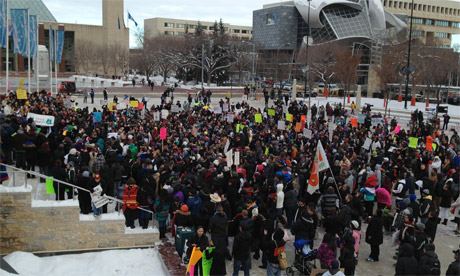An IdleNoMore rally in Edmonton, 11 December 2012.
The grassroots IdleNoMore movement of aboriginal people offers a more sustainable future for all Canadians
Canada's
placid winter surface has been broken by unprecedented protests by its
aboriginal peoples. In just a few weeks, a small campaign launched
against the Conservative government's budget bill by four aboriginal
women has expanded and transformed into a season of discontent: a
cultural and political resurgence.
It has seen rallies in dozens of cities, a disruption of legislature, blockades of major highways, drumming flash mobs in malls, a flurry of Twitter activity under the hashtag #IdleNoMore and a hunger strike by Chief Theresa Spence, in a tepee minutes from Ottawa's parliament. Into her tenth day, Spence says she is "willing to die for her people" to get the prime minister, chiefs and Queen to discuss respect for historical treaties.
The evidence – and source of the current anger and unrest – is hard to dispute. While Canada has the world's largest supply of fresh water, more than 100 aboriginal communities have tapwater so foul they are under continual boil alert (pdf). Aboriginal peoples constitute 3% of Canada's population; they make up 20% of its prisons' inmates. In the far north, the rate of tuberculosis is a stunning 137 times that of the rest of the country. And the suicide rate capital of the world? A small reserve in Ontario, where a group of school-age girls once signed a pact to collectively take their lives.
Such realities have not stopped politicians and pundits from prattling on about the sums supposedly lavished on aboriginal peoples. The myth that aboriginals freeload off the state serves to conceal the real scandal: that most money pays for a sprawling government bureaucracy that keeps aboriginals poor, second-class, and dependent. The widespread notion that First Nations mismanage and squander what funds they do receive is simple prejudice: government reports acknowledge that communities are buried under a mountain of strict accounting; they are no more corrupt than non-native municipalities.
Billions have indeed been spent – not on fixing housing, building schools or ending the country's two-tiered child aid services, but on a legal war against aboriginal communities. Every year, the government pours more than $100m into court battles to curtail aboriginal rights – and that figure alone went to defeating a single lawsuit launched by two Alberta First Nations trying to recover oil royalties essentially stolen by bureaucrats.
Despite such odds, the highest courts of the land have ruled time and again in favour of aboriginal peoples. Over the last three decades, they have recognized that aboriginal nations have hunting, fishing and land rights, in some cases even outright ownership, over vast areas of unceded territory in British Columbia and elsewhere. And that the treaties Chief Spence is starving herself to see upheld – signed by the British Crown in the 1700 and 1800s, and the Canadian government until the early 1900s – mean the land's wealth should be shared, not pillaged.
Continue reading here.
It has seen rallies in dozens of cities, a disruption of legislature, blockades of major highways, drumming flash mobs in malls, a flurry of Twitter activity under the hashtag #IdleNoMore and a hunger strike by Chief Theresa Spence, in a tepee minutes from Ottawa's parliament. Into her tenth day, Spence says she is "willing to die for her people" to get the prime minister, chiefs and Queen to discuss respect for historical treaties.
The evidence – and source of the current anger and unrest – is hard to dispute. While Canada has the world's largest supply of fresh water, more than 100 aboriginal communities have tapwater so foul they are under continual boil alert (pdf). Aboriginal peoples constitute 3% of Canada's population; they make up 20% of its prisons' inmates. In the far north, the rate of tuberculosis is a stunning 137 times that of the rest of the country. And the suicide rate capital of the world? A small reserve in Ontario, where a group of school-age girls once signed a pact to collectively take their lives.
Such realities have not stopped politicians and pundits from prattling on about the sums supposedly lavished on aboriginal peoples. The myth that aboriginals freeload off the state serves to conceal the real scandal: that most money pays for a sprawling government bureaucracy that keeps aboriginals poor, second-class, and dependent. The widespread notion that First Nations mismanage and squander what funds they do receive is simple prejudice: government reports acknowledge that communities are buried under a mountain of strict accounting; they are no more corrupt than non-native municipalities.
Billions have indeed been spent – not on fixing housing, building schools or ending the country's two-tiered child aid services, but on a legal war against aboriginal communities. Every year, the government pours more than $100m into court battles to curtail aboriginal rights – and that figure alone went to defeating a single lawsuit launched by two Alberta First Nations trying to recover oil royalties essentially stolen by bureaucrats.
Despite such odds, the highest courts of the land have ruled time and again in favour of aboriginal peoples. Over the last three decades, they have recognized that aboriginal nations have hunting, fishing and land rights, in some cases even outright ownership, over vast areas of unceded territory in British Columbia and elsewhere. And that the treaties Chief Spence is starving herself to see upheld – signed by the British Crown in the 1700 and 1800s, and the Canadian government until the early 1900s – mean the land's wealth should be shared, not pillaged.
Continue reading here.

No comments:
Post a Comment
Note: Only a member of this blog may post a comment.